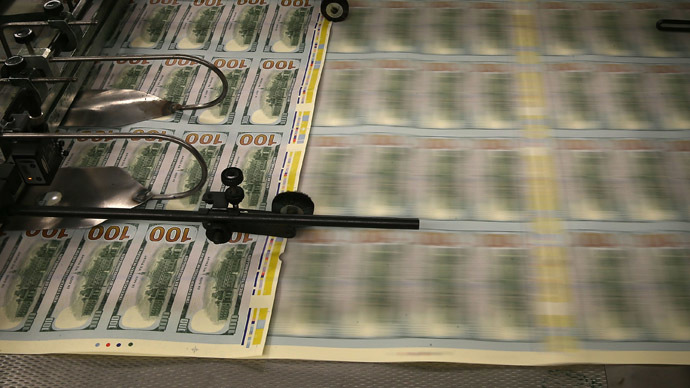Just a few days ago, we read that China is setting the stage for a new world reserve currency. Although we are expecting this to happen, it is still a shocking reality for the West.
ARVE Error: need id and provider
Through its official mouthpiece, China unleashed some very strong words against US foreign policies.
In reading the article below, let us put in context all the other recent articles especially Karen Hudes’ dropping of the “J” word.

BEIJING, Oct. 13 (Xinhua) — As U.S. politicians of both political parties are still shuffling back and forth between the White House and the Capitol Hill without striking a viable deal to bring normality to the body politic they brag about, it is perhaps a good time for the befuddled world to start considering building a de-Americanized world.
Emerging from the bloodshed of the Second World War as the world’s most powerful nation, the United States has since then been trying to build a global empire by imposing a postwar world order, fueling recovery in Europe, and encouraging regime-change in nations that it deems hardly Washington-friendly.
With its seemingly unrivaled economic and military might, the United States has declared that it has vital national interests to protect in nearly every corner of the globe, and been habituated to meddling in the business of other countries and regions far away from its shores.
Meanwhile, the U.S. government has gone to all lengths to appear before the world as the one that claims the moral high ground, yet covertly doing things that are as audacious as torturing prisoners of war, slaying civilians in drone attacks, and spying on world leaders.
Under what is known as the Pax-Americana, we fail to see a world where the United States is helping to defuse violence and conflicts, reduce poor and displaced population, and bring about real, lasting peace.
Moreover, instead of honoring its duties as a responsible leading power, a self-serving Washington has abused its superpower status and introduced even more chaos into the world by shifting financial risks overseas, instigating regional tensions amid territorial disputes, and fighting unwarranted wars under the cover of outright lies.
As a result, the world is still crawling its way out of an economic disaster thanks to the voracious Wall Street elites, while bombings and killings have become virtually daily routines in Iraq years after Washington claimed it has liberated its people from tyrannical rule.
Most recently, the cyclical stagnation in Washington for a viable bipartisan solution over a federal budget and an approval for raising debt ceiling has again left many nations’ tremendous dollar assets in jeopardy and the international community highly agonized.
Such alarming days when the destinies of others are in the hands of a hypocritical nation have to be terminated, and a new world order should be put in place, according to which all nations, big or small, poor or rich, can have their key interests respected and protected on an equal footing.
To that end, several corner stones should be laid to underpin a de-Americanized world.
For starters, all nations need to hew to the basic principles of the international law, including respect for sovereignty, and keeping hands off domestic affairs of others.
Furthermore, the authority of the United Nations in handling global hotspot issues has to be recognized. That means no one has the right to wage any form of military action against others without a UN mandate.
Apart from that, the world’s financial system also has to embrace some substantial reforms.
The developing and emerging market economies need to have more say in major international financial institutions including the World Bank and the International Monetary Fund, so that they could better reflect the transformations of the global economic and political landscape.
What may also be included as a key part of an effective reform is the introduction of a new international reserve currency that is to be created to replace the dominant U.S. dollar, so that the international community could permanently stay away from the spillover of the intensifying domestic political turmoil in the United States.
Of course, the purpose of promoting these changes is not to completely toss the United States aside, which is also impossible. Rather, it is to encourage Washington to play a much more constructive role in addressing global affairs.
And among all options, it is suggested that the beltway politicians first begin with ending the pernicious impasse.
source »
We have just released the Second Edition of Towards Healthcare Emancipation eBook. The proceeds from this book will be used to fund our next project, Towards Energy Emancipation.
The aim is to make the subject of free energy more understandable for the layman so that anybody could replicate and install his own power plant and be completely living off-grid.
If you haven’t done so, please like our FB page to encourage others to learn more about our work.
Thank you very much for your valuable support.
–
Losing faith: Global financiers look to de-Americanize

A US debt default could hit on Thursday, and world leaders are second guessing the dominant role America plays in finance. Regardless of the final decision in Washington, confidence and credibility in the US has already eroded.
In an editorial published by the Chinese state-owned press agency Xinhua, a columnist says the US economy has ‘failed’ and put many countries who hold state assets in dollars at risk.
“To that end, several corner stones should be laid to underpin a de-Americanized world,” the editorial read.
Last week China, the biggest US creditor, started to make preparations for a technical default on loans. The European Central Bank and the People’s Bank of China (PBC) have agreed to start supplying each other with their currencies, avoiding the dollar as an intermediary currency. The currency swap agreement will last for three years and provide a maximum of 350 billion yuan ($56 billion) to the ECB and 45 billion euro ($60.8 billion) to the PBC.
In a further sign of growing distrust, China introduced a so-called “haircut”, or a discount, on the value of US Treasuries held as collateral against futures trades.
Developing and developed nations are equally concerned, and institutions like the World Bank and the International Monetary Fund (IMF) have issued several warnings.
Christine LaGarde, managing director of the IMF told the US they must uphold their financial promises to the international community and raise their debt ceiling. Failing to do so would put the world “at risk of tipping yet again into a recession,” LaGarde said in an interview on NBC’s ‘Meet the Press’, which aired on October 13.
“You have to honor your signature, … give certainty to the rest of the world,” LaGarde urged the US, a strong supporter of the international lending tool.
The country that has long provided a sturdy backbone to the global economy is now teetering on a mass default. If US lawmakers don’t forge a solution to raising the debt ceiling by October 17, investors with US treasury bonds, one of the lowest-risk assets, could suffer.
“It’s not just China that’s at the mercy of US lawmakers, its everybody in the world that is at the mercy of US lawmakers right now,” David Kuo, Investment Advisor at Motley Fool, told RT .
“China is trying to diversify away from US Treasuries,” said Kuo, adding investors “cannot just assume an asset is 100 percent safe.”
China holds nearly $1.3 trillion in Treasuries, Japan has $1.14 trillion, and other big foreign creditors include Caribbean creditors, Brazil, Taiwan, Russia, and European nations.
Other creditors have decided to keep calm.
Russia, ranked the 11th on the list of the US top creditors with the estimated $132 billion in US Treasuries, plans to keep their Treasuries.
“I don’t see the need for revising our reserve investment strategy in US Treasuries,” Russian Finance Minister Anton Siluanov said at a press conference on October 11 following a meeting of the G20 finance and Central Bank chiefs.
“What’s happening now, I hope, is a fairly short-term situation,” Siluanov told reporters, noting Russia’s investment plan is long-term.
If the US misses the debt ceiling deadline of October 17 and stops paying its creditors, it would be the first major Western government to do so since Nazi Germany under Hitler in 1933, which wasn’t able to pay its debts following World War I.
The US has a bank holiday today in honor of Columbus Day; however, after making little headway on solving the budget gap, both the Senate and the House will hold sessions on Monday.
For Republicans, Obamacare has been a major stumbling block in agreeing to raise the debt ceiling, as they see the legislation as antithetical to their ‘small government’ philosophy.
source »








